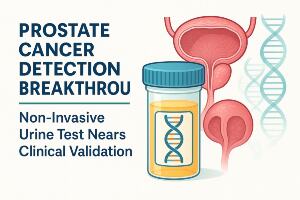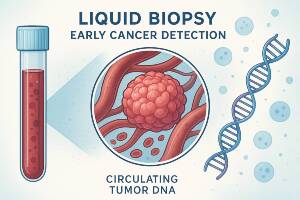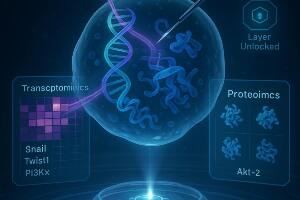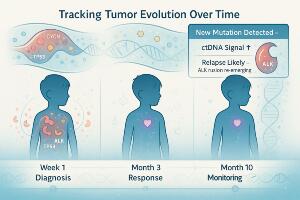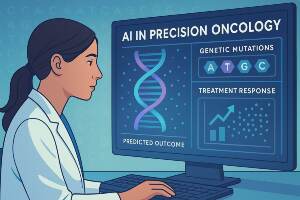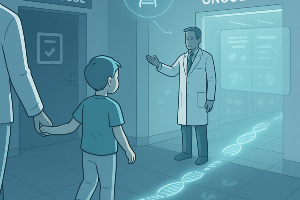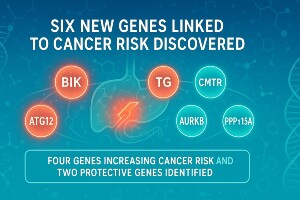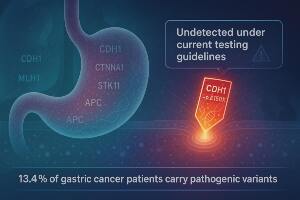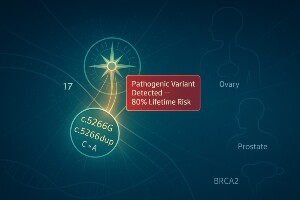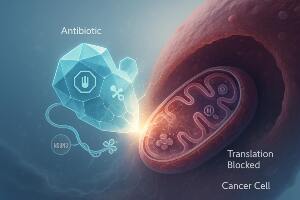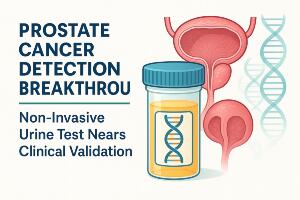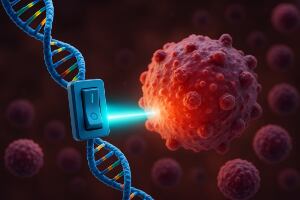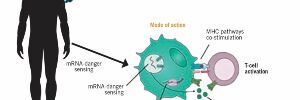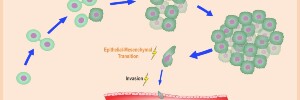News
Prostate Cancer Detection Breakthrough: Non-Invasive Urine Test Nears Clinical Validation
23 April 2025 | We are thrilled to announce that the development of our non-invasive urine test for early prostate cancer detection is nearing the completion of clinical validation. This innovative assay identifies prostate tumor-specific genetic abnormalities with high sensitivity, offering a simple and accurate method for detecting cancer biomarkers directly from urine samples.
Importantly, the test eliminates the need for invasive procedures like prostate massage, enhancing patient comfort and accessibility. With clinical validation close to completion, this tool is set to revolutionize prostate cancer diagnostics by enabling early intervention and improving treatment outcomes.
Stay tuned for further updates as we prepare for its integration into clinical practice!
Importantly, the test eliminates the need for invasive procedures like prostate massage, enhancing patient comfort and accessibility. With clinical validation close to completion, this tool is set to revolutionize prostate cancer diagnostics by enabling early intervention and improving treatment outcomes.
Stay tuned for further updates as we prepare for its integration into clinical practice!
Unlocking Early Detection: AI-Powered Breast Cancer Assay in Development
23 April 2025 | A promising research initiative aims to develop a combined circulating nucleic acid assay to detect early signs of tumor invasion in patients with malignant breast carcinoma. Using next-generation sequencing, the study identifies significantly altered RNA and DNA targets in peripheral blood linked to invasiveness.
The developed assay will utilize AI to generate an oncoindicative score, providing a precise measure of cancer risk and progression. This approach leverages circulating RNA markers as non-invasive tools for early detection and monitoring of invasive breast carcinoma, enabling early intervention and personalized treatment strategies.
The developed assay will utilize AI to generate an oncoindicative score, providing a precise measure of cancer risk and progression. This approach leverages circulating RNA markers as non-invasive tools for early detection and monitoring of invasive breast carcinoma, enabling early intervention and personalized treatment strategies.
We’ve arrived in Jakarta!
8 April 2025 | European Life Technologies has officially introduced itself to the Asian market, where our developments in bioinformatics and liquid biopsy have already generated strong professional interest. Our delegation participated in high-level ministerial meetings, engaging in successful discussions with key strategic partners.
Liquid Biopsy Refines Early Cancer Detection
27 March 2025 | Liquid biopsy emerged as a cornerstone of modern oncology diagnostics by enabling molecular profiling through ctDNA analysis. This non-invasive approach detects somatic mutations early and monitors tumor evolution dynamically, offering hope for improved patient outcomes through timely interventions.
Liquid Biopsy: The Future of Non-Invasive Cancer Detection
25 March 2025 | Liquid biopsy technology gained traction in 2021 as a revolutionary tool for early cancer detection. By analyzing circulating tumor DNA (ctDNA) and other biomarkers in blood samples, this method offers a minimally invasive alternative to traditional biopsies. It allows real-time tumor monitoring and can detect cancers before symptoms appear, making it a game-changer in oncology diagnostics.
Circulating Tumor DNA Revolutionizes Pediatric Cancer Care
18 February 2025 | The SMPaeds1 program demonstrated that ctDNA testing could detect mutations missed by traditional biopsies in children with solid and hematologic cancers. This non-invasive method offers insights into tumor evolution and relapse mechanisms, paving the way for less toxic and more targeted treatments.
AI Unlocks Genetic Clues for Precision Oncology
12 February 2025 | A USC-led study analyzed data from over 78,000 cancer patients, identifying nearly 800 genetic mutations influencing treatment outcomes. Using machine learning models, researchers predicted patient responses to therapies like immunotherapy and chemotherapy, advancing precision medicine in oncology.
AI-Driven Models Transform Oncology Care
12 February 2025 | AI-powered tools now analyze vast genetic datasets to predict individual responses to treatments like immunotherapy. These advancements allow oncologists to tailor therapies more effectively while avoiding ineffective options, marking a new era of personalized medicine.
Inherited Variants Linked to Pediatric Cancers Identified
2 January 2025 | Dana-Farber researchers uncovered rare inherited genetic abnormalities contributing to childhood cancers. These findings highlight the importance of germline testing in identifying at-risk children early for better monitoring and prevention strategies.
Whole-Genome Sequencing Identifies New Cancer Genes
8 November 2024 | A large-scale study published in Nature Genetics revealed six novel genes associated with varying cancer risks. For example, mutations in BIK were linked to prostate cancer, while PPP1R15A was found to reduce breast cancer risk by 53%. These findings open new avenues for targeted therapies and genetic screening programs.
Six New Genes Linked to Cancer Risk Discovered
8 November 2024 | Building on earlier genomic research, scientists identified four genes increasing cancer risk (BIK, ATG12, TG, CMTR2) and two protective genes (AURKB, PPP1R15A). These discoveries enhance our understanding of cancer predisposition and potential therapeutic targets.
Broader Genetic Testing Guidelines Proposed for Gastric Cancer
23 May 2024 | A study involving over 3,700 gastric cancer patients revealed that 13.4% carried pathogenic genetic variants similar to those seen in other cancers already covered by testing guidelines. These findings advocate for expanding genetic testing recommendations to include gastric cancer patients.
FDA Approves Hereditary Cancer Risk Blood Test
2 November 2023 | The FDA approved the Invitae Common Hereditary Cancers Panel, which analyzes 47 genes linked to hereditary cancers such as breast and colorectal cancers. This test empowers individuals with a family history of cancer to assess their risks and pursue preventive measures or early interventions.
Targeting Cancer’s Energy Supply
29 June 2022 | German researchers discovered how to halt the spread of head and neck cancers by disrupting mitochondrial RNA changes that fuel tumor growth. This novel approach could lead to therapies that prevent metastasis, the leading cause of cancer-related deaths globally.
Radiotherapy Personalization with Genetic Insights
11 April 2022 | A Spanish team developed a blood test that predicts whether brain-metastasized cancers will respond to radiotherapy. By combining this test with a drug called RAGE inhibitor, they enhanced radiotherapy's efficacy in resistant cases, offering hope for better personalized treatments.
Pancreatic Cancer Found in Stool Samples
9 March 2022 | Spanish scientists identified 27 microbial species in stool samples that can signal pancreatic cancer risk or early-stage disease. This non-invasive method provides a rapid and affordable diagnostic alternative, potentially improving survival rates for a cancer often diagnosed too late for effective treatment.
Genetic Switches Found in Aggressive Ovarian Cancer
15 December 2021 | OCRA-funded researchers discovered unique genetic switches in ovarian tumors and identified three potential drug targets for aggressive cancer forms. These findings also highlighted the role of the enzyme UCHL1, which may lead to new targeted therapies. Additionally, the antibiotic novobiocin was found effective against tumors with BRCA mutations, even those resistant to PARP inhibitors. These discoveries pave the way for more precise and effective ovarian cancer treatments.
Cancer: how one type of RNA could be the future of treatment
1 July 2021 | Cells are the basic building blocks of all living things. So, in order to treat or cure almost any disease or condition – including cancer – you first need to have a fundamental understanding of cell biology.
While researchers have a pretty good understanding of what each component of a cell does, there are still things we don’t know about them – including the role that some RNAs molecules play in a cell. Finding the answer to this may be key in developing further cancer treatments, which is what our research has sought to uncover.
While researchers have a pretty good understanding of what each component of a cell does, there are still things we don’t know about them – including the role that some RNAs molecules play in a cell. Finding the answer to this may be key in developing further cancer treatments, which is what our research has sought to uncover.
Messenger RNA Vaccines: Beckoning of a New Era in Cancer Immunotherapy
1 July 2021 | Messenger RNA (mRNA) vaccines are a relatively new class of vaccines. They combine the potential of mRNA to encode for almost any protein with an excellent safety profile and a flexible production process. During the last decade, the mRNA vaccine approach has been increasingly recognized and viewed as a versatile tool for the development of new innovative therapeutics not only in infectious disease settings but also in cancer. mRNA vaccines traditionally consist of a messenger RNA synthesized by in vitro transcription using a bacteriophage RNA polymerase and a template DNA that encodes the antigen(s) of interest.
RNA and Cancer Biology
1 July 2021 | Cancer is a complex multi-factorial disease that results from many molecular alterations. Among the observed effects are alterations in proliferation, growth, replication, and death of cells. Global genomic analyses coupled to functional assays have shown that altered gene expression is one possible mechanism of disease development. In human cells, genes are decoded in immature messages, which must be processed to generate functional proteins.

